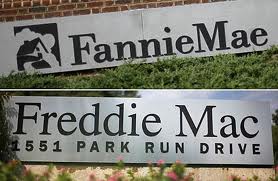 (NPR & ProPublica) -- New analyses by mortgage giants Freddie Mac and Fannie Mae have added an explosive new dimension to one of the most politically charged debates about the housing crisis: Whether to reduce the amount of money beleaguered homeowners owe on their mortgages.
(NPR & ProPublica) -- New analyses by mortgage giants Freddie Mac and Fannie Mae have added an explosive new dimension to one of the most politically charged debates about the housing crisis: Whether to reduce the amount of money beleaguered homeowners owe on their mortgages.
Their conclusion: Such loan forgiveness wouldn’t just help keep hundreds of thousands of families in their homes, it would also save Freddie and Fannie money. That, in turn, would help taxpayers, who bailed out the companies at a cost of more than $150 billion and are still on the hook for future losses.
The analyses, which have not been made public, were recently presented to the agency that controls the companies, the Federal Housing Finance Agency, according to two people familiar with the matter. Freddie Mac’s meeting with the FHFA took place last week.
The decision of whether to allow such reductions rests with Edward DeMarco, the acting director of the FHFA, who has steadfastly opposed so-called principal reductions on the grounds that it’s a bad business decision for the companies and would cost taxpayers money.
Many economists and policy makers contend that cutting principal — the amount of money lent to the homeowner — is one of the best solutions for keeping people in their homes and to bolster the fragile economic recovery.
But this solution has raised passionate opposition: Many borrowers who are paying their mortgages every month feel it is unfair. Why, they ask, should they have to keep paying the full amount while others who took a loan they ultimately couldn’t afford or saw their house plummet in value get a break? Some economists and policy makers argue that borrowers might intentionally stop paying their mortgages to score a reduction. Indeed, the prospect that the government would help troubled homeowners was a spark that created the Tea Party movement.
The companies’ new analyses were prompted by new Obama administration subsidies the government is offering Fannie and Freddie to reduce a homeowner’s loan. But it’s unclear whether DeMarco will take advantage of those incentives.
He declined to be interviewed for this story. But in a statement to ProPublica and NPR, DeMarco said that FHFA is assessing its position in light of the new Obama financial incentives, offered under the Home Affordable Modification Program, or HAMP. “As I have stated previously, FHFA is considering HAMP incentives for principal reduction and we have been having discussions with [Freddie and Fannie] and Treasury regarding our analysis.”
Both Fannie and Freddie declined to comment.
As an independent regulator, DeMarco does not answer to the president [3] and can make policies that the administration opposes. Obama sought to replace DeMarco, but his nominee was blocked by Republicans in the Senate, which must confirm the agency head.
As recently as Feb. 28th, DeMarco told the Senate banking committee, “Both companies have been reviewing principal forgiveness alternatives. Both have advised me that they do not believe it is in the best interest of the companies to do so.”
Overall, principal reductions could help millions of borrowers who owe much more on their homes than their houses are worth, economists estimate.
And principal reductions can help lenders, because foreclosure often leads to bigger losses than reducing the amount owed. The biggest banks have long employed such reductions [4] to curb their own losses.



